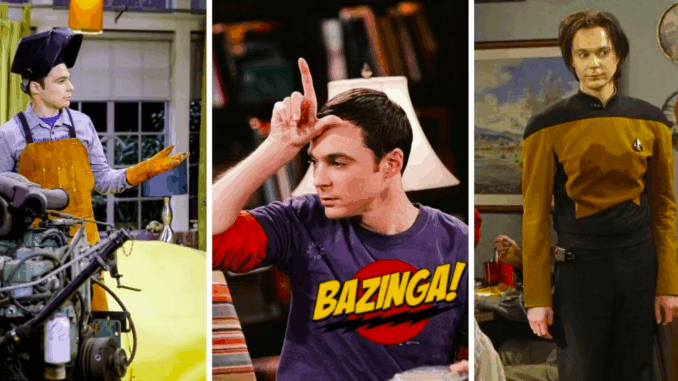
In the crowded pantheon of sitcom characters—from Kramer to Michael Scott to Barney Stinson—few have left as indelible a mark as Sheldon Cooper. Played with razor-sharp brilliance by Jim Parsons, Sheldon was unlike any comedic lead before him: a theoretical physicist with genius-level IQ, zero social filters, and an ever-expanding list of quirks.
Over twelve seasons of The Big Bang Theory, Sheldon went from a fringe curiosity to the center of one of the biggest television phenomena in history. But what made him so compelling? And why did audiences, across cultures and generations, come to love a man who rarely said “I love you” without a contract?
An Unlikely Breakout Star
Sheldon wasn’t supposed to be the fan favorite. Early press materials focused on the ensemble dynamic—Leonard and Penny were the heart, while Sheldon was comic relief. But from the very beginning, Jim Parsons’ portrayal stood out.
His precise delivery, physical comedy, and ability to make scientific jargon hilarious turned Sheldon into a standout character. Whether he was knocking on a door three times, claiming “I’m not crazy, my mother had me tested,” or demanding a specific spot on the couch, audiences couldn’t look away.
Parsons won four Emmy Awards for the role, and rightfully so—he took what could have been a one-note punchline and gave him soul.
The Balance Between Laughter and Empathy
What made Sheldon work wasn’t just the jokes. It was the delicate balance between his eccentricities and his hidden vulnerability. The writers never made fun of Sheldon’s probable neurodivergence; instead, they allowed his traits to evolve naturally.
He didn’t “overcome” who he was. He learned to connect through trust, repetition, and effort. His relationship with Amy Farrah Fowler, his attempts at friendship with Howard and Raj, and even his quiet moments of insecurity turned him into a character of emotional depth.
In a landscape of slick, fast-talking sitcom leads, Sheldon was something else entirely: complex, layered, and deeply human—despite his best efforts not to be.
The Power of Specificity

Sheldon’s brilliance as a character came from his specificity. His routines, his catchphrases, his love of trains, his disdain for change—all were rooted in careful, consistent characterization. He wasn’t “weird for laughs.” He was Sheldon.
And that consistency made the rare moments of emotional openness all the more powerful. When he finally told Amy he loved her, when he gave Penny advice without sarcasm, when he hugged Leonard without flinching—those moments hit hard because they were earned.
In the final episode, his Nobel Prize speech wasn’t about science. It was about friendship. And the moment he acknowledged the people who stood by him—even when he didn’t make it easy—was the emotional payoff of a twelve-season arc.
A Cultural Touchstone
Sheldon Cooper is now firmly embedded in pop culture. His image adorns T-shirts, Funko Pop figures, and memes. His catchphrase—“Bazinga!”—launched a thousand internet jokes. And his character inspired deeper conversations about representation, particularly around autism, OCD, and social anxiety.
Although The Big Bang Theory never explicitly labeled Sheldon, many fans—especially those who identified with his behavior—felt seen for the first time on television. He wasn’t the joke. He was the journey.
A Legacy of Complexity
In the spin-off series Young Sheldon, audiences are now watching the early years of the Cooper genius. But it’s the older version—awkward, arrogant, evolving—that remains iconic.
Sheldon Cooper wasn’t just a sitcom character. He was a challenge to the idea that comedy needs to be easy, predictable, or loud. He was smart, stubborn, and strange.
And somehow, he became beloved.
Because in the end, Sheldon Cooper didn’t need to change who he was to grow.
He just needed people willing to knock three times and wait.